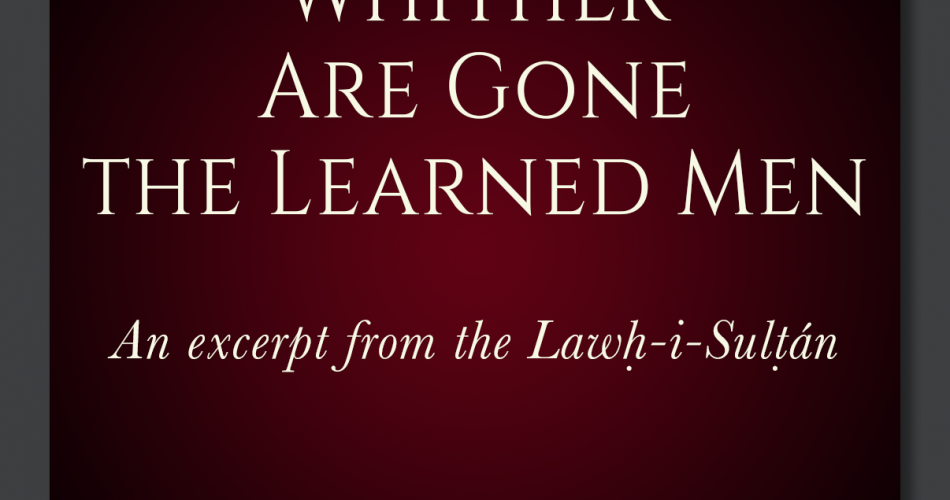Whither are gone the learned men, the divines and potentates of old? What hath become of their discriminating views, their shrewd perceptions, their subtle insights and sage pronouncements? Where are their hidden coffers, their flaunted ornaments, their gilded couches, their rugs and cushions strewn about? Gone forever is their generation! All have perished, and, by God’s decree, naught remaineth of them but scattered dust. Exhausted is the wealth they gathered, dispersed the stores they hoarded, dissipated the treasures they concealed. Naught can now be seen but their deserted haunts, their roofless dwellings, their uprooted tree-trunks, and their faded splendour. No man of insight will let wealth distract his gaze from his ultimate objective, and no man of understanding will allow riches to withhold him from turning unto Him Who is the All-Possessing, the Most High.
Bahá’u’lláh
أَيْنَ العُلَماءُ وَالفُضَلاءُ وَالأُمَراءُ أَينَ دِقَّةُ أَنْظارِهِمْ وَحِدَّةُ أَبْصارِهِمْ وَرِقَّةُ أَفْكارِهِمْ وَسَلامَةُ أَذْكارِهِمْ وَأَيْنَ خَزائِنُهُمُ المَسْتُورَةُ وَزَخارِفُهُمُ المَشْهُودَةُ وَسُرُرُهُمُ المَوْضُونَةُ وَفُرُشُهُمُ المَوْضُوعَةُ هَيْهَاتَ قَدْ صَارَ الكُلُّ بُوراً وَجَعَلَهُمْ قَضَاءُ اللهِ هَباءً مَنْثُوراً قَدْ نُثِلَ ما كنَزُوا وَتَشَتَّتَ ما جَمَعُوا وَتَبَدَّدَ ما كَتَمُوا أَصْبَحُوا لا يُرى إِلاّ أَماكِنُهُمُ الخالِيَةُ وَسُقُوفُهُمُ الْخاوِيَةُ وَجُذُوعُهُمُ المُنْقَعِرةُ وَقَشيبُهُمُ الباليَةُ إِنَّ البَصيرَ لا يُشْغِلُهُ المالُ عَنِ النَّظَرِ إِلَى المآلِ وَالخَبِيرَ لا تُمْسِكُهُ الأَمْوالُ عَنِ التَّوَجُّهِ إِلَى الغَنِيِّ المُتَعالِ
حضرة بهاءالله
This is a passage from Bahá’u’lláh’s Tablet to Náṣiri’d-Dín Sháh, also known as the Lawḥ-i-Sulṭán. It was delivered to that Qájár king by the great Badí‘, who was martyred for carrying out this task. The combinations of various plural nouns, verbal conjugations, and other linguistic factors give this passage a palpable musicality in the original Arabic.
This passage is also very special to us here at the Utterance Project because it is the one that inspired us to start this initiative in the first place. When we first met (Adib Masumian and Violetta Zein), we exchanged written communications around the Bahá’í Holy Writings in the original Arabic and Persian. In discussing an exchange that happened sixty years prior between Hand of the Cause Tarazu’lláh Samandari and Violetta’s father Kamal Zein in Tunisia, where Hand of the Cause Samandari had referred to Arabic and Persian as “the Languages of Bahá’u’lláh,” Adib was moved to record a voice note to Violetta of one his personal favorite excerpts from the Holy Writings that best demonstrated, in his eyes, the untranslatable musicality of the Bahá’í Holy Writings in the original languages. As soon as Violetta, who does not read or speak Arabic or Persian, heard Adib reciting this very excerpt from the Lawḥ-i-Sulṭán, the idea of the Utterance Project came to her mind fully-formed: a place on the Internet where people could experience the wonder she had experienced when she heard that passage recited for the first time. Over the next four months, Adib and Violetta worked to create the Utterance Project, where those who do not speak or read Arabic or Persian can directly access the beauty of the Bahá’í Holy Writings with subtitles and transliteration; hear the rhyming and the musicality, in spoken form, not chanted or accompanied by music; and begin to engage with the Bahá’i Holy Writings in the languages in which they were originally revealed.
Original Sources
Further References
